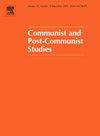现代摄政
IF 1.3
4区 社会学
Q3 INTERNATIONAL RELATIONS
引用次数: 3
摘要
现存的文献已经表明,常规化的领导继承对威权韧性的重要性。然而,导致专制国家有序权力转移的因素尚不清楚。本文认为,有序的继任需要现任者相对和平地退出。满足这三个条件,中国的领导层继承导致了“现代摄政”的出现,在这种情况下,年长的领导人可以相对自愿地退休,并在退休后继续影响一个政权的政治,特别是通过主动监督未来的领导层继承。相比之下,在不满足独裁者下台的最初要求的情况下,苏联的领导层继承被描述为平行继承,既不包括精英政治常规化的可信计划,也不包括像中国那样的老年领导人和年轻一代同时共存。此外,在20世纪80年代末类似的政权危机中,现代摄政的安排帮助延长了中国的独裁政权,而苏联在没有这种保障的情况下崩溃了。本文章由计算机程序翻译,如有差异,请以英文原文为准。
The Modern Regency
Extant literature has shown the importance of routinized leadership succession for authoritarian resilience. However, the factors leading to orderly power transitions in autocracies are unclear. This article argues that an orderly succession requires relatively peaceful exit of the incumbent. Through a comparison of the power transition trajectories of the post-Stalin USSR and China in the Age of Deng Xiaoping, this article proposes three conditions that facilitate the voluntary retirement of dictators, including their strong political will to institutionalize successions, adequate capacity to initiate the plan, and reliable retirement packages. Meeting all three conditions, leadership succession in China has resulted in the emergence of the “modern regency” in which the elder leaders can retire relatively voluntarily and continuously influence the politics of a regime after their retirement, especially by proactively supervising future leadership successions. In contrast, without meeting the initial requirements for a dictator’s exit, the case of leadership succession in the USSR is characterized as parallel succession, which includes neither a credible plan on routinization of elite politics nor simultaneous coexistence of the elder leaders and the younger cohort as in the case of China. Moreover, during similar regime crises in the late 1980s, the arrangement of the modern regency helped prolong the authoritarian regime in China, while the USSR collapsed without this safeguard.
求助全文
通过发布文献求助,成功后即可免费获取论文全文。
去求助
来源期刊

Communist and Post-Communist Studies
Multiple-
CiteScore
1.90
自引率
0.00%
发文量
23
期刊介绍:
Communist and Post-Communist Studies is an international journal covering all communist and post-communist states and communist movements, including both their domestic policies and their international relations. It is focused on the analysis of historical as well as current developments in the communist and post-communist world, including ideology, economy and society. It also aims to provide comparative foci on a given subject by inviting comments of a comparative character from scholars specializing in the same subject matter but in different countries.
 求助内容:
求助内容: 应助结果提醒方式:
应助结果提醒方式:


